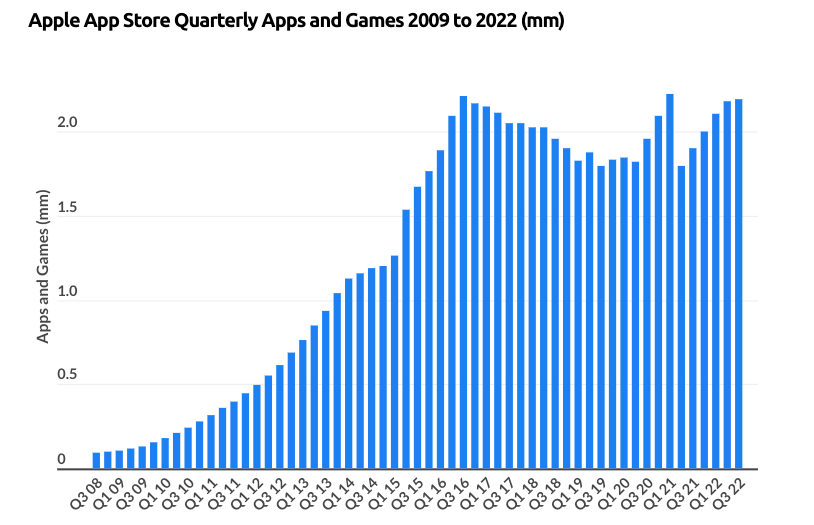Has Every App Been Built?
The App Store was released 15 years ago and revenue is slowing down, while founders are struggling to build venture scale ideas
My career in technology started in 2009, which was probably the best time ever to be an aspiring product person in our industry.
If you lived in San Francisco during that golden era, you would mindlessly say the words “I have an app idea” for almost every problem in your life. Supportive co-workers and friends would nod their heads, like you might have actually discovered the next billion dollar idea.
But that was a long time ago.
In 2023, the App Store will turn 15 years old, and the common phrase that has replaced “I have an app idea” for aspiring founders is that “every app has been built.”
The App Store has 3.59 million apps and 948,000 games (which are 21.8% of apps). App Store growth for new products peaked long ago hinting that the design space for builders is no longer exciting for founders.
Even in a cold bear market, most consumer founders we meet in 2023 are building in web3 because there is a feeling that mobile apps are no longer the best place to start a venture scale company.
This week, 2022 App Store revenue data released by Data.ai showed that the App Store revenue, while still a big market, has slowed down.
Mobile app spend declined for the first time in 2022 after seeing 19% year-over-year growth in 2021
Spend across across all app stores including the App Store and Android Play Store is down 2% to $167 billion
The bright news for Apple and mobile developers is that:
Downloads grew to 255 billion (+11 YoY)
Hours spent in mobile apps peaked at 4.1 trillion (+9% YoY).
Short form video apps attention are the fast growing category, dominated by TikTok was responsible for 3.1 billion hours os user generated content (+22% YoY) with spending reaching $5.6B (+55% YoY) - revenue that goes to creators.
Despite the optimistic data on downloads, engagement, and short form video, App Store revenue growth is a concern for attracting new developers.
We are pro-web3 at Chapter One and Apple’s treatment of developers in the category and within our portfolio has been the definition of anti-innovation.
Most Chapter One founders who have submitted anything crypto related to Apple in 2022 were stuck in an approvals process that can take months, with very little guidance on how to comply with App Store rules. This means slower experimentation cycles and months of wasted burn.
I’ve felt the Apple pain myself. Despite being the top grossing app in the world at Tinder while running revenue at the company (2015-2019), we were often met with app rejections that had little explanation.
I’ll save those war stories for another time, but I mention the experience because Apple has a history of being challenging to deal with for app developers.
At Tinder, I could text message our account lead at the Google Play Store and he would call me back within minutes. Apple would barely respond to my emails.
With a growing need for new revenue channels in the App Store, we hope to see a more friendly web3 stance from Apple in 2023. A web3-friendly App Store might even make consumer developers feel like mobile is the right place to start a venture scale company.
But the concerns with Apple are not limited to web3.
We saw similar challenges in the creator economy, where Apple has historically taken 30% from creators who are the equivalent of small business owners.
Fanhouse (Chapter One portfolio company) tried pushing back against Apple on behalf of creators in 2021 and Apple did not relent.
At the moment, we are advising portfolio companies in web3 to build for the web first and control your own destiny.
Even with slowing App Store revenue, we don’t believe Apple will change their stance anytime soon.






Great post, and an important subject. Mobile distribution is so important, and it's hard to see how "consumer web3" can have its mobile moment as long as Apple keeps up its current stance.
What do you think the driver/incentive would be for Apple to change their stance voluntarily?
Side note: It will be interesting to see if more information surface this year about Apple's work to open up for third-party app stores and payment rails to comply with new EU regulations. That could be a trigger, I guess.
Totally agree with controlling your destiny — your domain, your content, your contacts, your keys. That’s the dream. But it’s a steep hill to climb with time in browser trending down to 10% compared to time in app.
Which revenue pill do you take? 9X potential at 30% discount or 1X potential at 3-5% discount best case?
These numbers won’t reverse easily. Our feeling is that consumer founders leveraging web3 will need to build for both with a strategy to “upgrade” users to direct channels over time. That upgrade incentive will need to be huge and will cut hard against the grain assuming Apple makes no change.
Network tokens/ownership spread across your userbase behind your app seems like the most compelling (and defensible) play between now and 2030.